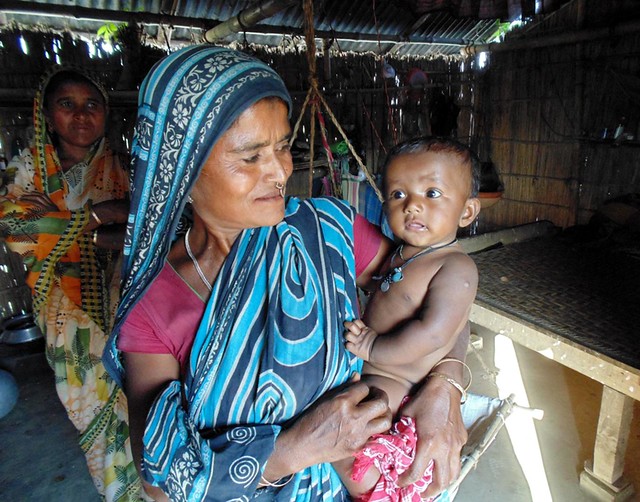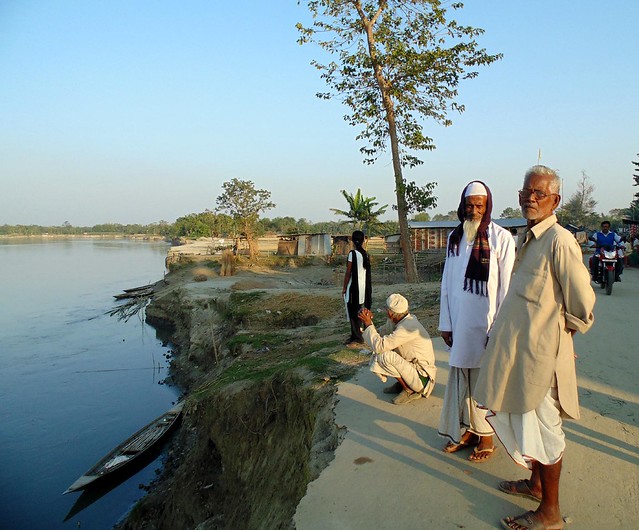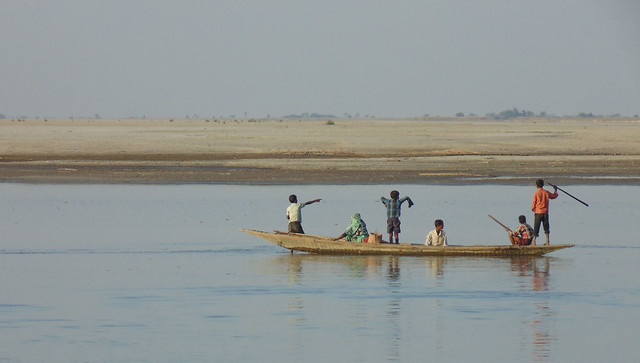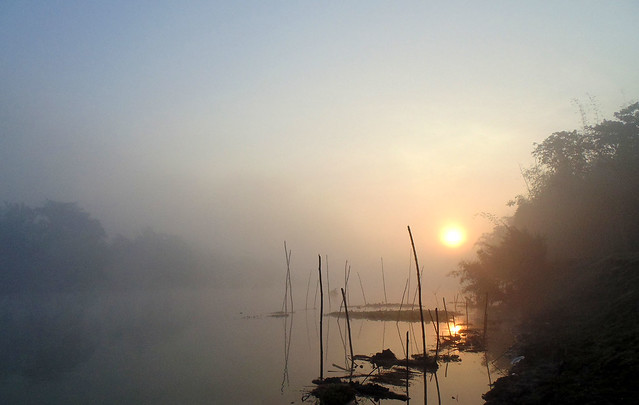By TwoCircles.net Staff Reporter,
Guwahati: Be it Hasina Bibi, Anand Biswas or Rahmat Ali, their story is all the same besides being the fact that all of them belong to Assam. Ali is a 75 year old man living in a cottage on the bank of Beki River, a tributary of Brahmaputra at Sunpora in Barpeta district with an uncertain future.
Not just today, most of the years of his live have been spent like that only since he could recall the childhood days. All credit goes to the erosion caused by the river and the indifferent attitude of the government.

Hasina Bibi with one of her grandchild in her 12th house.
So, Ali after having changed his house for several times is planning to shift his house for the fourth time near Sunpora Reserve Forest area in the last 10 years. “We need to find a better place within a short period of time. This has become a part of our lives. Not just me, almost every family residing here face the same fate,” said the man pointing his finger at the locality.
At present Ali and his family struggle hard to make the ends meet. Once upon a time at least he could afford to dream with a little bit of plot of land but that too was shattered during the fateful summer of 2001, under cruel waves of river Beki.

Rahmat Ali and Anand Biswas stand on the bank of river Beki with a gloomy future.
“I had my own plot of land at Dawki near Jania but everything was finished. Now, we are even unable to dream,” said Ali whose only son works in Guwahati as an auto-rickshaw driver. But he has been giving the tax for the plot of land which is still under water for the last 12 years. So far, in the name rehabilitation, the gentleman has got Rs 500 in early 1990s.
The fate is same with Anand Biswas who has also living with his son and daughter in law in a newly built thatched roofed bamboo house. “Besides the river, we have nothing to take pride of. Our lives depend on the river only. If it wishes it can wiped us out within the night. We are totally helpless. The local representative of the government hardly visits us,” Biswas who once used to be a carpenter said.

The boats are the only means of communication to the outer world for the people.
Even the Jania Sattra, one of the Vaishnavite monasteries established to spread the message of peace and harmony by the great 15thcentury saint Srimanta Sankaradev, is also in danger from the erosion. “It’s a very critical phase here of the people and the properties. The people are living in hell without any future. What they will do in the coming days? I’m scared to think the future of their children. Besides, if the government does not take any immediate step, the place of great historical or cultural importance will be doomed soon,” said Abdul Kalam Azad, a research scholar who visited the area for a study.
If all these were so, meet this 50 year old lady – Hasina Bibi who has shifted her house as many as 12 times during the last two decades. But no obstacles seem to deter this lady from the dream of a better tomorrow as she believes in the power of education and sends her seven year old grandchild to ‘nearby’ school which is around 5 kilometre away. Whereas according to the norms, there should a lower primary school in every one kilometre. Baharul who studies in the first standard of Dawkmari Lower Primary school has to cross the river and walk up to school every day.

Even such beautiful rays of dawns have failed to bring any hope for these people stuck in a fateful zone.
“I wish my grandchild becomes an educated man to lead our family. We do not want to stay like this rest of our lives,” said a hopeful of Bibi.
Besides, their lives are not at all of the 21st century world when these people still do not have a proper sanitation system leave alone the facility of proper drinking water or the basic health facility or transportation.
“After 9 pm their area is disconnected for the rest of the world as the only way of communication is the boat. We cannot think of electricity. We even don’t know if we will be able to see it in our life time here in our village. We are utterly helpless if a woman becomes seriously ill after 9 pm,” said a fisherman who also has a boat to ferry the local passengers across the river. But they would continue to vote. “If we don’t vote we will be thrashed out of the state as Bangladeshi. So, we never miss to vote,” said Bibi.
This way life goes on for hundreds like Ali, Bibi and Biswas in the of 21st century India.
(Photos credit: Abdul Kalam Azad)
